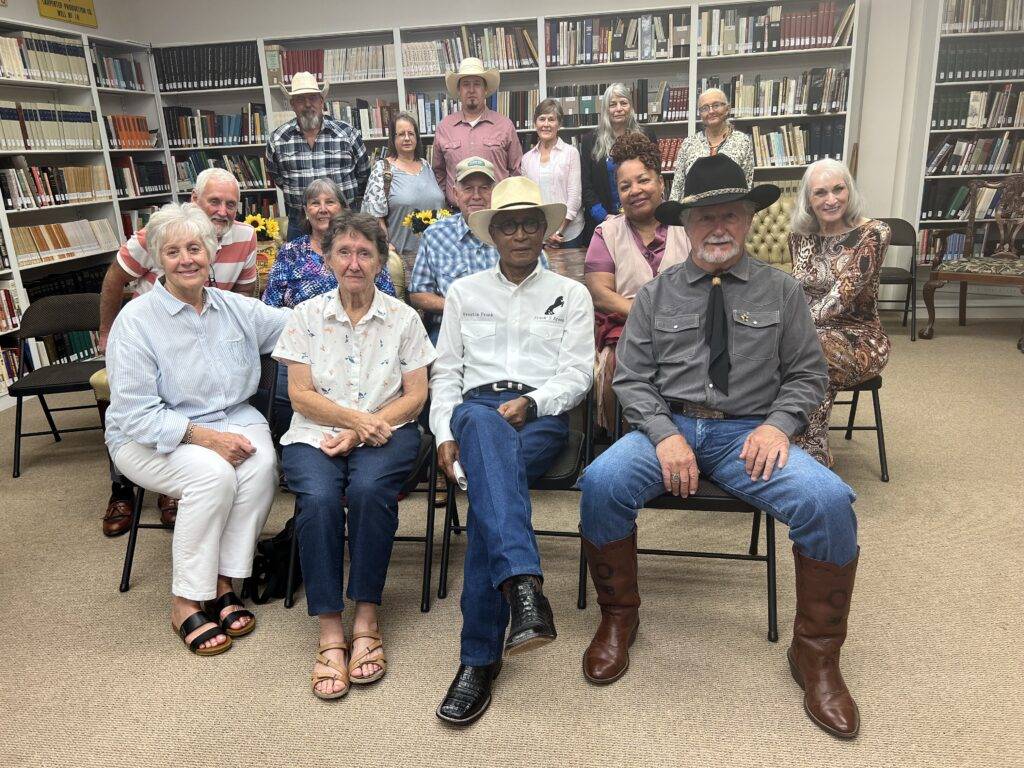History of the Black Cowboy in Chambers County

Preston Frank at the Chambers County Museum at Wallisville
By Gloria Way
“There’s a lot of history to tell,” said Preston Frank. “And it needs telling”. Frank from Cheek, Texas spoke to a group at The Chambers County Museum at Wallisville last Thursday evening.
Marie Hughes, co-director of the museum, has established a series of lectures featuring the history of cowboys held monthly at the museum. This past Thursday the series featured the history of the black cowboy in Chambers County. Frank, son of the legendary Floyd Frank, very eloquently spoke of the life of the black cowboy and the love of the land among the black community. Preston Frank said his grandfather was a “real cowboy,” who, “actually rode a bucking horse in Buffalo Bill Wild West show that came to Dayton, Texas back in 1930.”
Preston Frank said the cowboy lifestyle was one embraced by Black people despite its negative connotations. “The word cowboy came from a Black guy being called a boy out on the ranch taking care of the cows,” Preston Frank said. Floyd Frank became the only man from the Southeast Texas area to be inducted into the National Multicultural Western Heritage Museum Hall of Fame.
Frank reminisced about being raised among hardworking people whose whole lives evolved around the raising of cattle. “There was no racism among the ranchers and workers in those days,” said Frank. “People lived off the land and the cattle they raised. Out in the country, that’s the only way you survived.” He added, “The minorities were sometimes the only people around who knew how to work the land and the cattle. There was only one goal among the ranch owner and the workers, and that was how to ensure you take care of mama cows to raise healthy baby calves to sell to make money.”
After the Civil War, many newly freed black people sought work and opportunity in the booming cattle industry of Texas. Southeast Texas, with its large open lands and growing cattle operations, became a hub for this labor. Ranching required hard labor, and black cowboys often found jobs as trail drivers, ranch hands, and horse trainers.
In exchange for labor, some of the large ranch owners traded labor for land. As a result, you had a lot of black landowners who knew how to raise cattle and take care of the land. The landowners passed down to their children and grandchildren the skills of running a successful ranch. While working on their own land, many of the black landowners continued working full-time for the large ranchers or in other endeavors
Frank spoke fondly about working with large ranch owners in southeast Texas such as the McFaddin’s, JT White, the Jacksons, Pipkins, Boyt Ranch and the Barrows.
The mission of Preston Frank today is to inform minority landowners how to protect their property. “Through the years, land has been passed down from one generation to another,” emphasized Frank. “And today a lot of business entities are trying to “lease” this land for different purposes. One of the latest business land deals has to do with carbon capture. As you know, I own property in Cheek, and ExxonMobil is trying to lease up all the land in Cheek to lay pipelines for their carbon capture projects. Fourteen landowners and I formed a community association to make sure that our neighbors don’t give away something for nothing.”
Frank wants to protect the integrity of the land and keep land in the hands of the minority landowners. He also stressed that most of these small landowners find a trade to support themselves that will allow them to keep their land. “Most cowboys were broke and uneducated. My daddy loved cowboying. He loved the rodeo. Despite how people of that time viewed cowboys, Floyd Frank was also an entrepreneur. He upholstered furniture and organized rodeos at his ranch in Cheek. “ My dad’s business help pay for putting on rodeos,” said Frank. “My dad believed in being able to reward the cowboys that rodeoed in his rodeos.”
Frank taught his son Preston not only the ways of the ranch and rodeo but also how to make money upholstering furniture. “My father reupholstered all the furniture in the Hotel Galvez in Galveston. It took almost a year,” said Frank.
Those teachings are what have enabled Preston Frank to keep his father’s ranch going.
“I’m able to tell this story because my father trained me and taught me the things that he knew,” Preston Frank said. “What I’m doing is what was done by my grandfather and by my father, and some of my kids know how to do this too.”
While his love of the black cowboy and rodeo history is evidence, Frank is very proud of his skills as an upholster. “Look me up on Facebook and YouTube,” he laughs. “Preston Frank Upholstery, 409-842-2666!”